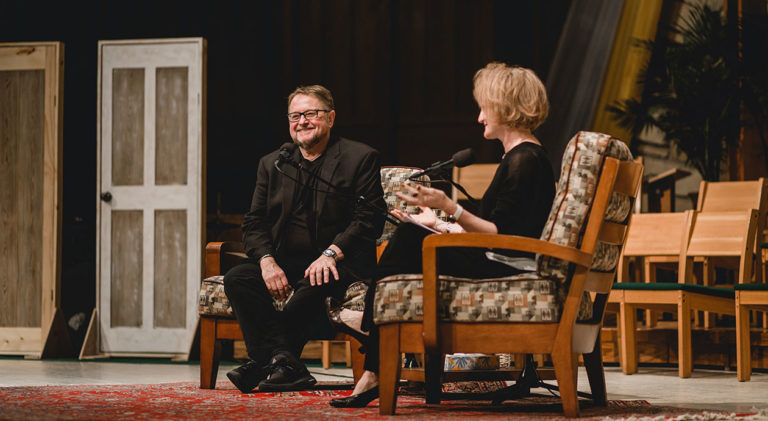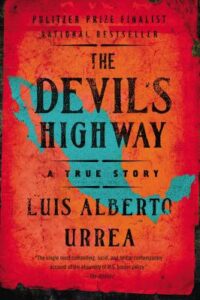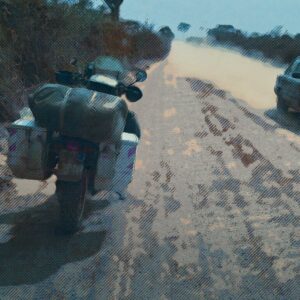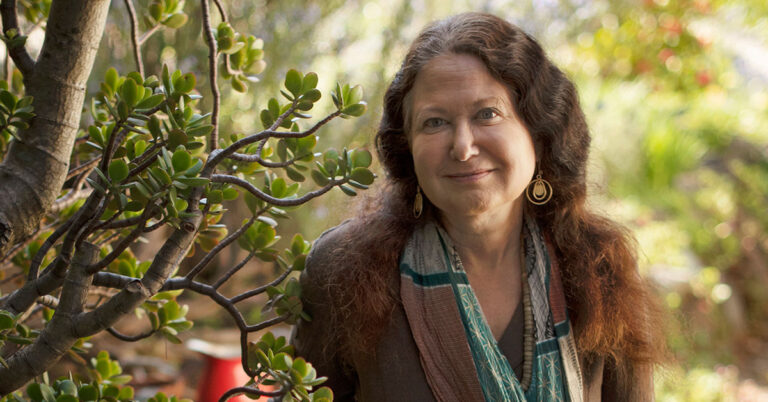Luis Alberto Urrea
On Our Belonging to Each Other
We humans have this drive to erect barriers between ourselves and others, Luis Alberto Urrea says, and yet this makes us a little crazy. He is an exuberant, wise, and refreshing companion into the deep meaning and the problem of borders — what they are really about, what we do with them, and what they do to us.
The Mexican-American border was as close and personal to him as it could be when he was growing up — an apt expression of his parents’ turbulent Mexican-American divorce. In his writing and in this conversation, he complicates every dehumanizing stereotype of Mexicans, “migrants” — and border guards. A deep truth of our time, Luis insists, is that “we miss each other.” He offers a vision of the larger possibility of our time beyond the terrible tangles of today: that we might evolve the old illusion of the melting pot into a 21st-century richness of “us.” And he delightfully models that messiness and humor will be required.

Image by Bethany Birnie, © All Rights Reserved.
Guest

Luis Alberto Urrea is a distinguished professor of creative writing at the University of Illinois Chicago. His books of poetry, fiction, and nonfiction include Into the Beautiful North, The Devil’s Highway, The Hummingbird’s Daughter, and Goodnight, Irene.
Transcript
Transcription by Alletta Cooper
Krista Tippett: We humans have this drive to erect barriers between ourselves and others, and yet this makes us a little crazy, as Luis Alberto Urrea observes. What a refreshing, helpful way into the deep meaning and the problem of borders — what they are really about, what we do with them, and what they do to us. This wise and exuberant writer says that a deep truth of our time is that “we miss each other.” And the Mexican-American border was as close and personal to him as it could get when he was growing up — an apt expression of his parents’ turbulent Mexican-American divorce. Ever since I had this conversation with him, I have not heard a news report of something happening at the southern border of my country without having his voice in my head, confounding every caricature of Mexicans — and the suffering human beings we now call “migrants.” I am also eternally grateful for the way he complicated my imagination about the moral agency of a U.S. border guard. In this conversation, he offers a vision of the larger possibility of our time beyond the terrible tangles of today, which he lives and witnesses with his writing. That we might evolve the old illusion of the melting pot to a 21st-century richness of “us.” And delightfully, he models that messiness and humor will be required.
I’m Krista Tippett, and this is On Being.
[music: “Seven League Boots” by Zoë Keating]
Luis Alberto Urrea writes poetry, fiction, and nonfiction; his books include Into the Beautiful North, The Devil’s Highway, The Hummingbird’s Daughter, and a 2023 novel Goodnight, Irene, inspired by his mother’s service in the Red Cross. I interviewed him in 2018 in the St. Croix Valley on the border between Minnesota and Wisconsin.
[applause]
Tippett: Good evening. I’m delighted to be here tonight with Luis Alberto Urrea. He has published in nearly every genre. He’s written nonfiction, memoir, short stories, and poetry. He’s written historical novels; his historical novel, The Hummingbird’s Daughter, is based on the story of his father’s Aunt Teresa — is that correct? That’s that book?
Luis Alberto Urrea: My great-great-aunt.
Tippett: Great-aunt, known as the “Mexican Joan of Arc,” [laughs] a Mexican mystic folk healer and revolutionary insurgent. And I have to say, you have an inordinate number of characters like that in your family.
Urrea: I do.
Tippett: [laughs] So, we could go on.
Urrea: Okay. [laughs]
Tippett: He’s even written an award-winning mystery story, and so, not surprisingly, has been called a “literary badass”…
[laughter]
[laughs] …which we probably can’t say on public radio. I see, in your person, another quality that is not quite so sexy, but in our global moment is so urgent and, I think, so vividly desired and needed, and that is that you are a “bridge person.” Here’s something Luis Alberto Urrea likes to say: “There is no them; there is only us.”
[applause]
And the way that is explored and revealed through your work is not to reduce us to some kind of monolithic mass; it’s not the melting-pot “us,” but to grapple with the 21st-century multiplicity of human identity; I think, to imagine making a new richness of us. This is in your body, and it’s in your history. You were born of a Mexican father, an American mother; but it’s a lot more complicated, even, than that.
Urrea: Yes, it’s wonderfully complicated.
Tippett: [laughs] You were “Louis” to her and “Luis” to your father.
Urrea: Or worse.
Tippett: Or worse. [laughs]
Urrea: Pick any exasperated Spanish word, if you know them; that’s what he would call me.
Tippett: [laughs] And you were actually born in Tijuana, and as I understand it, well, it seems like the border ran through your bloodline; it ran through your parents’ marriage…
Urrea: Yes, it did. [laughs]
Tippett: …and at one point, it actually ran through your house.
Urrea: The border ran right down our sad little barrio apartment because their marriage came apart. It was doomed from the start, in some ways. And I always tell audiences, the kitchen was the United States, and the living room was Mexico.
[laughter]
And I was in the middle. And both of them were trying to win a culture war, I think, and so, to my mother, I was Louis; I was Louis Woodward, one of her relatives. And she watched my English like a fascist border guard. And my father —
Tippett: To make sure you were speaking it.
Urrea: “One speaks proper English. One does not say ‘Yeah.’ One says, ‘Yes, mother dear.’” And in the barrio, you can see me saying, “Yes, mother dear” and being promptly beaten up for it.
And my father was extremely chauvinistic. He loved Mexico, and everything Mexican was the best thing. And so, he was living in terror that I would skew more American than Mexican. So I was raised twice, at the same time.
[laughter]
I was a Mexican boy and an American boy.
Tippett: So how would you start to think about what is the spiritual imprint on you, or perhaps the spiritual work that that left in you for the rest of your life, straddling a border like that in your person, from the very beginning of your life?
Urrea: A couple of things: I was — I don’t know why, but I’ve always been God-crazy. I have been drawn toward whatever the cosmic mysteries are from boyhood on, to my father’s chagrin. God has always felt like my companion in everything.
And I — you’ve read the books; they’re full of naughty bits and bad language and bad behavior, but I think you are trying to portray “us,” the human family, warts and all. But critics often identify me as this political writer, and I say, no, I’m more interested in the soul’s journey. First, you have to admit, yes, we have a soul. A lot of people don’t want to go there. But even my atheist friends read me, because it’s funny.
Tippett: I think the word “soul” is coming back, too, I think.
Urrea: It is coming back.
Tippett: People are getting — I think people are realizing, we can’t really do without it. So we have to figure out what we mean when we say it in this world.
Urrea: Right, and you brought up Hummingbird’s Daughter. Just imagine 20 years studying with shamans and medicine people to write that book. So I’ve become — I used to work with Baptist missionaries. They’re not sure what kind of beast I am now. They don’t know if I’m in league with Satan or not, because I’ve got a very strange view. But I find the sacred in almost everything. So, you know.
Tippett: I think that’s not unconnected to something Ursula Le Guin said to you…
Urrea: [laughs] Okay.
Tippett: …who was a teacher to you and…
Urrea: She was my discoverer.
Tippett: …your discoverer.
Urrea: She started my career.
Tippett: You report, this was something she said, I believe, in a class: “We writers are the raw nerve of the universe. Our job is to go out and feel things for people, then to come back and tell them how it feels to be alive. Because they are numb. Because we have forgotten.” And I feel like that — you go out to feel things about the boundaries between humans and the borders we build between ourselves; specifically, the U.S.-Mexican border. And the back and the forth of it has been there all the way through your life, as well as your writing.
So, as you said, you moved to — you were born in Tijuana. You moved to the U.S. at a young age. You were finishing college on this side of the border. And then, in the year of your graduation, when your father was on a trip on the other side of the border, he was killed. Do you want to say anything about that? That’s obviously a terrible part of your story.
Urrea: The journey was really interesting for me because I thought I was just like everybody else, just like I think you’re all just like me. So, when I meet you, I think, “Oh, yeah, you got a Mexican grandma. You all speak Spanish. You used to eat peanut butter on a hot corn tortilla, just like me.” And you didn’t. But in some ways, we all are the same, because we all have family and history and memories and so forth. And so I would spend my boyhood going back and forth across the border, and at the end of fourth grade, there was an outbreak of street violence; somebody wanted to hurt me, in particular. And my parents thought, “We’re gonna get out of here and move to my mom’s people; go up to a white neighborhood, an Anglo neighborhood.” And to my mother’s undying, I think, shock and chagrin, we were seen as the invading Mexican family in this neighborhood. And she was like, “Dear boy, I’m from New York City. My family are from Virginia.”
But that didn’t — she was tainted by our existence, which was shocking to all of us. And I had learned Spanish before I learned English, so I had an accent. And it was at that point when people started calling me racial names, which was a great shock. So that transformation hit hard and fast.
I went to college. I was the first to go to college in my family because my parents pushed me. And thank goodness for that. And in my senior year, being my father’s first child — he had other… My dad was a traditional Mexican man. He had families.
[laughter]
But I was the only one in this family. And since I was the first, he wanted to get me a graduation gift. And so, he drove into his hometown — 27 hours, and he retrieved money for me as a graduation gift. And he drove back 27 hours and was caught by bad Mexican cops, and he died. And it was not good. And then, they wouldn’t let me bury him. They made me buy him. I was 20 years old, not ready, so I bought my dad.
And that ended everything for us. We were completely destitute. My brothers and I took up a collection to bury him. We buried him in an unmarked grave in Tijuana.
But then, in steps Le Guin, who — I had written a story about that, and she took me in when she read it, and she published it. It was my first sale. So, in some ways, that sacrifice launched everything that’s meaningful.
Tippett: And I think it’s important, also, right here, to point out that you write about the fullness of what it is to be Mexican.
Urrea: Well, yeah. We rule.
Tippett: And it’s not all poverty, and it’s also, as you say, it’s not like everybody in Mexico is dying to get to the U.S., which is a narrative that’s very strong at the moment. So you draw out these layers of complexity, which also includes beauty and whimsy and all the things that happen in life. And one of the things you write about very convincingly — you don’t just write about it, you live it convincingly — you say Mexico is the true melting pot. You live and breathe — you are the living, breathing embodiment of that.
Urrea: Yeah, look at us. We have Apaches in our family, Yaqui indigenous people; of course, the Murrays. And Urrea is not a Mexican name, it’s Basque. So my grandfather was Basque, and in Basque, it means “golden man; man of gold.” So in other words, Bubba-looking, once again. And then we have Chinese Urreas, the Wong family, Wong Urreas. And recently, I met a bunch of Samoans. So I thought, “Ah, my Samoan cousins. How cool is that?”
[laughter]
Tippett: [laughs] And it goes all the way back to, what, the Visigoth invaders of Iberia?
Urrea: Well, you know. When I was researching Hummingbird’s Daughter, I was — my family’s always been really thrilled that in Don Quixote, Don Quixote mentions the Urrea family. And he says: You know, I am not a powerful man like the Urreas of Galicia. And so, we’ve been going out to lunch on that for about 500 years.
[laughter]
And so, when I started researching the region my family is from originally, it’s a village named Urrea, and it was under the Visigoth king named Urias, spelled almost exactly the same. So when I started going through their notes about the Visigoth ancientness of the family, I thought that was kind of cool. And the reason I started making a little bit of usage of that was because there was a time when white supremacists were dogging me and threatening me and offering to kill me and my family, and so forth. So I could write them back and say, “I don’t know what you’re saying, man. I’m a Visigoth. I’m the only Aryan here in this conversation.”
[laughter]
They couldn’t take it. It would make them furious, but they wouldn’t know what to do.
Tippett: You point out some interesting things about language, and how our vocabulary is full of borrowed words. I think that’s important and interesting, also, because the insistence that Spanish-speaking Americans have upon speaking Spanish feels like something new, I think, in this melting-pot culture.
I’m not sure that’s right; I wonder, if we could go back 100 years, if we would find the Germans were still speaking German, and — whatever.
Urrea: All you have to do is go into the North End in Boston, and people are speaking Italian. Amongst your folks, you do.
Tippett: Yeah. Right. But so you point out all these words, and it seems like you had a lot of fun, listening for this.
Urrea: Oh, I was having a field day.
Tippett: All the words borrowed from Spanish, like, well, “coyote,” “marijuana” — there’s a good one. “Stampede.”
Urrea: “Hoosegow,” “calaboose.”
Tippett: “Key,” as in Florida Keys; “Florida.” “Bonanza,” “bronco” — all these words; beef “jerky,” “vanilla,” “chocolate.”
Urrea: “Rodeo.”
Tippett: “Rodeo.” [laughs] Here’s something — where do you say — yeah, you also say, “English! It’s made up of all these untidy words, man. Have you noticed? Native American (skunk), German (waltz), Danish (twerp), Latin (adolescent), Scottish (feckless)…” on and on. “It’s a glorious wreck (a good old Viking word, that). Glorious, I say, in all its shambling, mutable beauty. People daily speak a quiltwork of words, and continents and nations and tribes and even enemies dance all over your mouth when you speak.”
[applause]
Urrea: Why, thank you. Well, it’s true. I don’t quite comprehend the need for insult, the need for paranoia and aggression and I understand; I’m hearing all this new scientific talk, explaining how, of course, the mind is tribal, and we bond with our tribes, and we’re fearful of the stranger, and so forth. But there’s a particular tide of it in the United States, and it’s been here for an awfully long time. And I think I got a bit politicized when people started — well, I did when I was a kid, when they started calling me “greaser,” “wetback,” “taco bender,” “beaner,” all this stuff, which was a shock to me, and started telling me that everything bad was Mexican, everything filthy — because honestly, until fifth grade, everyone I revered was Mexican, and all of a sudden, in fifth grade, you’re told they’re all scum, invaders. I thought, what? It’s no accident to me that in fifth grade I lost my Mexican accent and started speaking like my mother. I didn’t mean to, but I wasn’t — I was in full-on survival mode, because I didn’t understand what had just happened. And I think that bafflement sticks with me to this day, and I don’t understand.
As a teacher — I teach in Chicago, and I watch students fear each other. I come into a class, and African-American students are on one side, and white students are on the other side. Or I come into a class, and there’ll be two young ladies with a hijab, and no one will sit near them. There’s an empty arc of seats around them. And so I’m always trying to find ways to stop these things, because it only takes this much, I think, for us to see each other, know each other, and then, love each other. And that’s what’s so dangerous. That’s very dangerous.
So one of my writing rules with my students, which I use all the time — and it’s why the books are so comedic in places — is, I always tell the students that laughter is the virus that infects you with humanity. And if you sit with somebody and laugh — not at them, but laugh with them wholeheartedly — how in the world can you get up from that table and say, “Pssh, those people.” You can’t. And if you’ve laughed with them, you’re going to cry with them, too. That laughter is a very dangerous portal for humanity.
Tippett: We are learning these things about our brain and how they really are trying to help us. They’re trying to help us, because the complexity of reality is overwhelming. So we — what is it — we interviewed Mahzarin Banaji, who helped create the field of implicit bias. And she says, the mind is a “difference-seeking machine.” But it’s also how it’s creating order for us and making reality feel manageable, and I — but it’s not — it doesn’t have to become hardened and hostile.
And then I also feel like these things we’re learning about ourselves — it’s very new, very new knowledge, really — will be a form of power, just like those tools, those humanizing tools are forms of power.
Urrea: It’s maybe a redistribution of power. Maybe it’s a more collaborative power, communal power. My daughter — for whatever reason, my youngest daughter, Chayo, she just thinks, somewhere deep in her soul, she’s a Norse woman. She’s a Viking. And I’ve had to listen to years, now — I know everything about Odin, and — it’s amazing. But what’s really cool is that she has understood things outside of the myth we have of the rampaging, maniac Viking, berserker, killing everybody. And now she sees all this stuff, and she tells me, “Vikings were feminists, Dad.”
[laughter]
And it’s part of my curse now that she tells me things like, “Yeah, you men? Gotta go.”
[laughter]
That’s what daughters are for. All men have to go to an island.
Tippett: So what we do with borders and walls, that’s where this hardens.
Urrea: Yes, it does.
Tippett: And you’ve written recently about going to visit the Otay Mesa border crossing to see the wall in progress. And I love — one thing that you do is, you just plant that place in its history of 12,000 years of being inhabited by…
Urrea: The Kumeyaay.
Tippett: …Kumeyaay Indians. That also softens something, seeing that sweep of time.
Urrea: Yeah. It’s been on my mind for many years. And when the immigration issue caught up with me after a couple of books, and I was talking about it, people would be really offended and upset with me. And I would always get the same response: “My family, sure, they were immigrants. But we did it legally, unlike you guys. We had papers.” And so I started being a jerk and saying, “Who checked them, Geronimo?
[laughter]
“Crazy Horse stamped the papers?”
[applause]
So it’s ridiculous and, in some ways, a folly to say, “Can’t we all just get along?” But it is the truest thing that I don’t understand why we can’t. And part of it, I have to say, — in my new novel, for the first time — I’m feeling very mature right now, because for the first time in my writing career, I made the hero a Republican — just to show everybody that I can.
Tippett: Like your mother; a Republican like your mother.
Urrea: My mom was a serious Republican. So I just wanted people to know, yeah — I feel like our family is scattering, worse and worse, and we need to be able to talk with each other. We need to be able to enjoy each other’s point of view, even if we don’t agree with it. And I think I am certainly in the world of so much grievance that — I have Facebook friends who have the Make America Great Again hat. And when they say something, people attack them. “How dare you say that to Luis?” And I say, “Wait, don’t you have your own page? Because if I didn’t like those guys, I would — unfriend them. They’re my friends.” And we have fun, sometimes, attacking each other, just because we can laugh, I hope. We can talk, I hope. And when we can’t, we are in serious, serious trouble. And we’ve seen what the world is like, over and over again, when you must be silent. It’s not good.
Tippett: And I feel like one thing you do, as much in your fiction as in your nonfiction, and certainly in Into the Beautiful North, but is, you work with the idea of a border or a wall, not as a — not, in fact, as a hard and fast thing: as a liminal space, as a liminal zone.
Urrea: It is a liminal space, absolutely.
Tippett: Right, but that is a — just to think about it that way opens up a lot of imagination and—
Urrea: I think liminal space is where all writers go. Jane Hirshfield has some beautiful stuff about being in liminal space. That place of crossing, that place of pressure, of two things meeting — that’s a rich — that’s where the plankton wells up and the currents meet. And you can choose to see it in different ways. And either the border is a hideous, festering scar of oppression, horror, and violence, or it’s a fraternal space where two cultures meet and can exchange. And honestly, particularly before the Narco Wars, there was a — and there still are bastions of friendship along the border. And all you have to do is go to places near Nogales or Yuma, where kids on the Mexican side and kids on the American side play volleyball over the wall with each other.
Tippett: Yeah, and see, we don’t hear these stories.
Urrea: No, you don’t. And I recently did a ballet — I didn’t. I read poems while they danced.
Tippett: I’m imagining it.
Urrea: No. Me in a tutu — nah.
[laughter]
But I narrated this ballet. It was the 100th anniversary of a Stravinsky piece, which included a Faustian journey through a wasteland, where the man trying to get to safety has to make a deal with the devil, essentially. And the composer-slash-conductor, who was reviving the ballet, thought that my work was appropriate for this era. That was 100 years ago; this time, it’s people dying in the desert, making that terrible deal to survive. But when he did his other piece — his name is Steven Schick.
Tippett: Oh, yes.
Urrea: He’s brilliant. I keep saying, “This guy’s…”
Tippett: So he did a concert on the land where the wall is being built.
Urrea: Yes, he did. He went three miles down the road, the dirt road, and he set up American musicians on one side of the wall, and Mexican musicians on the other side of the wall. They couldn’t see each other. But he conducted, and the Mexicans could watch the video of him conducting, and each side had 300 people watching. And they did a concerto together to prove that those walls — you can’t stop art. You can’t stop human touch or communication. It flew over the wall.
[applause]
Tippett: And he also spent some time in Berlin, right? And that was a wall with which I had some intimacy. And I remember, still, when Michael Jackson came and did a concert right on the western side of the wall, just as things were falling apart. But the concertgoers gathered right on the eastern side. It was exactly that. That couldn’t — but I’m pretty fascinated with walls. Have you been to the wall in Belfast?
Urrea: No. Let’s go.
Tippett: Well, see, that one is interesting too, because that one is almost just like a safety blanket right now. It’s still there, even though it’s no longer true that you will almost certainly be killed if you’re the wrong person going into the wrong neighborhood across the wall. But one thing you point out is — so in Berlin, on the western side, the wall was painted and raucous and alive and rebellious — on the western side, where people were free. In Mexico, what do you say? In Mexico, it’s the Mexican side —
Urrea: It’s the reverse.
Tippett: It’s the reverse side that’s —
Urrea: Well, thank God for Steven Schick. I stole it, when he was telling me it, because it was the perfect wrap-up for that piece for The Times. When you went across to the other side, he said, the Mexican side, the entire fence is an art gallery covered with paintings, sculptures, graffiti. There are ice-cream men and taco stands, and there are mariachis, and there are lovers, and there are people dancing and strolling. The American side: steel, trucks, dogs, helicopters, guns.
Tippett: No art, no graffiti.
Urrea: No nothin’, and he said: I suddenly realized that that was the Soviet side in Berlin.
[laughter and applause]
Tippett: Yeah, it was. And I think you said, “Who was free? Who was free, and who was prisoner?”
Urrea: Yeah, what exactly is that wall for, then? Hmm.
Tippett: I want to read something that you wrote about — here’s another thing you said about borders; a border is “an imposed metaphor on a family.” You said, “The border” — you were talking about specifically that region — “the border remains a fluid, mutating, stubbornly troubling, enthusiastically lethal region. Perhaps it’s not a region at all. Maybe it’s just an idea nobody can agree on. A conversation that never ends, even when it becomes an argument and all participants kick over the table and spill their drinks and stomp out of the room.” You say, “I was born there.”
Urrea: I was born there. And I do think that it’s a convo that is alien. But it always surprises people who don’t know a lot about the border, up here, north of the border — even if you go to Phoenix, regardless of what politicians tell you, people in Phoenix aren’t really clear on what the border is. It’s not very far away, but it’s already alien. Well, people in Mexico are the same way. They don’t — it’s not like people wake up everyday and say, “Ah, the border. Let’s go!” They don’t. And it’s just the direst need that brings you to it. And it’s a different world.
An example of that was, I got to go to Mexico City in the late ’90s, and I was interviewed by La Jornada, a great Mexican newspaper. And they were asking me about myself, and I thought — like you said, “the border ran down your kitchen” — I thought, “I’m gonna get ‘em now.” And I said, “In a certain way, the border fence goes right down the middle of my heart. My heart is bisected by barbed wire.” And the reporter said, “That’s great. That’s great.” Mexico City. When the article came out, it said, “If you cut his chest open with a knife, there’s a border patrol truck idling in his heart.” I was like…
[laughter]
…that was truly lost in translation.
[laughter]
[music: “Dirtbike Lovers” by Blue Dot Sessions]
Tippett: In the early 2000s, Luis Alberto Urrea ventured into nonfiction reportage, training a journalist’s eye on the Mexican-American border for his book The Devil’s Highway. This became an adventure that changed him, and the part of the conversation with him that follows also ever after changed the lens with which I read stories about that border. Though to be clear, these stories he tells described details and realities that have surely changed in smaller and larger degrees along with our world in the two decades that have followed.
[music: “Dirtbike Lovers” by Blue Dot Session]
Tippett: When did you write The Devil’s Highway? When was that?
Urrea: Well, I started working on it in 2001. They died in May, and I started working in August. But it came out in 2004.
Tippett: So that is a story — to me, also, I see that you — as much as you’ve been thinking about this, not just for 25 years but since 1955 — you’ve also had a journey in just going farther and farther into the layers of complexity. And one of the things that struck me about this — this is really as much reportage, I think, as it’s narrative nonfiction. And it’s about a terrible story of 26 Mexican men who set out across this desert known as The Devil’s Highway, and heading for Arizona, heading hopefully for work, and 12 of them made it, and 14 were just burned to death under that sun.
And one of the things you’ve said is that when you set out to write it, you were tired of people just demonizing — not seeing these people as humans. One of the interesting things that happens — oh, yeah, that you were sick of the “toxic reduction” of these people. One of the things that you also ended up seeing is the humanity of the border patrol.
Urrea: I didn’t mean to.
[laughter]
Tippett: You didn’t mean to. But that’s a huge, huge piece of the story, and it’s in Agent Arnie Davis in Into the Beautiful North, right? That’s a very affecting piece of this book.
Urrea: Well, thank you. It was a big shock to me. I went in as, frankly, a really bad writer. I thought I had it all. I thought, “I am Mr. Witness, Mr. Enlightened Progressive.” And I thought, I’m going to witness everybody except those jerks over there in the border patrol — I’m gonna burn those guys. Because I just believed they were bad guys. And they knew it. They knew it before I walked in the door, and they made my life quite difficult.
And the supervisory agent of Wellton Station, Kenny Smith, a lovely man, a 30-year veteran of the border patrol, while they were basically eating me alive, tearing my sinews off my bones, he came out, and he said, “What’s going on?” They said, “This idiot’s writing this book about the…” And he just looked at me, and it’s what I call grace. I don’t know what else to call it. But this moment came, when his eyes focused and he looked at me, and he said, “I sent out the rescue. I sent out that big Banzai Run.”
And at that moment, without knowing it, my life changed. And he took me in, and he began training me. And he took me out and showed me what it means to track people and what it means — how to know what time of the morning somebody walked by. It was incredible. I realized this guy had a Ph.D. in dirt, I say in the book, because he could read a piece of dirt like we read a poem in a lit class; and he was saying things that were blowing my mind.
And there came this moment — the transformational moment, for me, was standing on the Devil’s Highway with him. And there’s nothing there. There’s no fence. There’s no barbed wire. It’s just desert, as far as you can see. And there’s a sign with some bullet holes in it that says, “If you come to the United States, we’ll really be depressed.” That’s about it.
[laughter]
And I am standing there with him, and he says to me — and mind you, I still think they’re evil. He says, “I know what you think of me.” And I remember looking, because he’s got his .40-caliber Glock on his belt, and I thought, “Oh, man.” And he said, “You think I’m a jack-booted thug.” And I was busted. I wasn’t gonna say, “Well, yes, I do.” I just stood there. And he said, “I am your jack-booted thug in shining armor.” And he started talking about his life.
And he told me all this amazing stuff that I couldn’t have imagined in 100 years: how agents park — they live 70 miles, 50 miles away from any station, because it takes that long to get into the game and change the human being you were when you woke up, to the human being that has to go out there. And he said, “And you gotta drive 70 miles home because you gotta go home and bounce your child on your knee.” And he said to me at one point — it’s a white cowboy. He says to me, “My daddy was a rancher. I’m a rancher. You know what I do all day? I chase ranchers around this.” He said, “I know they’re my own people.” And he said, “My job is to save innocent civilians dying a terrible death. My job is also to arrest those same civilians.”
Tippett: Right, the both parts of that equation that you didn’t know. Once, you talk about how there’s — in this swirl of things that get — these accusations that are made and assumptions that are made; that there’s a criticism that American taxpayers are paying for comfort stations and expensive light towers. And then you said, “Wrong. In fact, the towers are built, raised, maintained, and paid for out-of-pocket by those bleeding-heart liberals, the Border Patrol agents themselves.”
Urrea: They —Okay, they’re cops. So they’re not stupid, they’re sly. So they designed lifesaving towers with shiny mirrors that can be seen for many, many miles away. And they’re solar-powered. They have a call button. And they have a sign that says, “You will die. You will not make it to the freeway. And if you’re in distress, push this button. We will be here before a half-hour, and save you.” And being cops, they put them in the places where the most people walked. Yeah, it gave them more arrests, but yeah, it gave them access to save people. And that was designed and built in garages by border patrol agents; they went out and put them up themselves. And they paid for them. Those were little things.
And when he was telling me all this stuff — all my alarms went off. All my Chicano, border, Mexican, liberal, may-not-love-border-patrol — it was like the robot in Lost in Space — “Danger, Will Robinson.” “May not love border patrol.” And I couldn’t help myself. And he told me these things about being a dad, being a husband, and dead people he had seen, and all this stuff. And I turned to him, and I said, “Kenny — Kenny, I love you, man.” And he just — he never looked at me. He just kept looking in the desert and said, “I kinda like you too, buddy.”
[laughter]
How can you not write a book?
Tippett: Yeah, okay. I think this is actually what you’re getting at right there. You have this experience, you’ve said, that at the same time people want to strengthen barriers, we seem to want to supersede them, and this makes us a little crazy. You said, “We’d like to be able to speak to each other. We miss each other.”
Urrea: Yeah, don’t you think?
Tippett: I do think. But there’s something about somebody like you writing it down that way, and I read it, and I know it’s true.
Urrea: I do think it’s true, and I think — the border, to me, is just a — it’s a metaphor. All we have to do is look around us. The border’s everywhere. Look at the world we’re in: Muslim ban, Black and white, Black Lives Matter, gay, bi, trans, immigrants, North and South, Christian and not. Anywhere you want to go, there are these weird fences. And I can look in any audience and see fences. And so, yeah, I think we miss each other. And yeah, I’ve tried to train myself to be able to listen and not just react automatically. I think that’s — and that goes back, maybe, to my theological mania, too: that I just think that there’s a great loneliness.
Tippett: You also have observed, somewhere, that — I think you said something like, having the life you’ve had, you think that each and every one of us is at least bicultural.
Urrea: Yeah, somehow. I think you’re all Mexicans, but I know you’re not.
[laughter]
I just — it’s the default. I don’t — and I think about this thing a lot. There’s a great Mexican-American novelist, named Rudolfo Anaya. A lot of people don’t know him. But he wrote a classic novel called Bless Me, Ultima, which was, when I was growing up, the book about Mexican healer women. And I owe a lot to that book for figuring out how to do Hummingbird’s Daughter. But when I was a kid, he told me this amazing thing. He said, “If you, in your writing, can make your Tijuana grandmother the grandmother of a reader in Iowa or Nebraska,” he said, “you have committed the strongest religious and political act in the world.”
And I’ve always kept that as one of my prime writing rules, and that’s what I’m thinking about, that we can — if we could talk to each other without agendas — I’m not trying to convert anybody, I’m just telling you how I feel — I think people will listen. The acid test is if you have to talk to kids. I have to talk to kids because of the NEA, all the time. And kids will shut you out like that, [snaps] if they sense any kind of a come-on or a “I’m gonna get you to vote a certain way” or “Accept the Lord” or whatever I want you to do. I just tell you my story; they know if you’re telling the truth, and that means a lot to me. So I’m trying to be as willing to listen to people as I am to blab at them.
And there’s a lot of wisdom that can be had from both sides of the aisle, if we’re willing to listen to it. And I admit, most of the time, I’m like, “Are you kidding?” I’m watching MSNBC every night, saying, “Are you kidding me?”
[laughter]
But I’m still willing to listen. [laughs]
Tippett: Okay, let’s have a couple questions.
Audience Member: This is two questions. You can answer either, or both, “What is the hardest thing about non-Latino audiences? When presenting your work way up North, what must you do differently, compared to Los Angeles, San Antonio, or even Chicago?”
Urrea: Not a doggone thing. There’s — it’s absolutely wonderful. There’s nothing — sure, in San Antonio we speak Spanish more. But other than that, no. People — these are readers. People are readers, and they want to know things, or they wouldn’t be reading. So no, I feel — we have this phrase in Spanish, “en familia.” You’re “in your family” everywhere I go, because people are kind.
[applause]
Tippett: So if the “we” is not a melting pot, what is it that we’re evolving towards? I know Richard Rodriguez talks about the “browning” of America.
Urrea: Ooh, I hate that.
Tippett: You hate that. I kind of thought you would. So I don’t think — so it doesn’t have to be that, because in a way, that’s another way of talking about the melting pot — “We’ll just eventually all look alike, so it won’t matter.”
Urrea: Well, it fed into a negative narrative. It sounds like some kind of stain in your laundry, “the browning of America.”
[laughter]
Tippett: So we’ll leave him outside. So just pretend like I didn’t mention him.
Urrea: No, no, it’s good.
Tippett: What are we evolving into? What would your hope be, your dream, that we’re evolving into?
Urrea: Oh, gosh — Star Trek.
[applause]
We’re going to have a culture, perhaps, where there’s a kind of Federation of Planets. What’s wrong — what is wrong with seeing a stranger in the dark and have that stranger only raise a hand to you to wave hello and not hit you? What’s wrong with that? So that, to me — my family, my naming my daughter Rosario Teresa, doesn’t take away from your child named Biff or Sally. It doesn’t — we don’t have to — it doesn’t harm anyone. And it seems so simple to me, and enjoyable, to be able to appreciate someone else’s culture or music or cuisine, or even to listen about their religion and say, “That’s very interesting.”
Tippett: I like that. So we evolve into just enjoying each other more.
Urrea: Well, wouldn’t that be nice? I think it sure would — except maybe in sports, right?
[laughter]
Tippett: [laughs] We can still hate each other in sports.
Urrea: Yes, oh, absolutely.
Tippett: All right, this is completely self-indulgent, but when you were in that — one of those pages in the — I think in the Book Review of The Times, recently, and talked about books you like, and you said you really like hard-boiled mystery novels. And I do too.
Urrea: You do?
Tippett: And I can’t — and it’s hard for me to explain that.
Urrea: I knew I liked you. I knew I liked her.
Tippett: [laughs] But I say — one thing I say is, I want a world without murder but not without murder mysteries.
Urrea: Oh, exactly. Oh, yeah.
[applause]
Yeah, absolutely. [laughs]
Tippett: So what is that, though? [laughs] What is that, that we also, as humans, as creatures, we can be against this, and yet, somehow, we have to grapple — or, I don’t know. I don’t know. What is it? This may be an unanswerable question.
Urrea: I think, deep down in my heart, I wish I was Jack Reacher and could just kick open a door and shoot all the bad guys — maybe. I don’t know. It is the old Whitman line of “I contain multitudes.” There are all sorts of sides to me. And I think that detective genre is fascinating for a lot of reasons. My wife is very much more literary in her tastes than, sometimes, I am. And we’ll be lying in bed, and I’m reading the new Lee Child or James Lee Burke — I’ll buy any James Lee Burke, on sight; and she’s reading some incredibly turgid thing about a melancholy Russian thinking about I don’t know what.
[laughter]
And she will say to me, “So has the tragic alcoholic detective met the wistful yet large-breasted woman in trouble yet?”
[laughter]
And I take umbrage; I’m like, “No! Are you kidding? It’s not that kind of book.” And then, at about page 110, I’ll say, “Yeah, he just met her, yeah.”
[laughter]
It’s a formula. I think it’s like watching really good TV, maybe. And those archetypes are fascinating, because they really go back all the way to knights, as Raymond Chandler pointed out so long ago. Plus, they’re just cool, man. They’re cool books.
Tippett: This is a beautiful book of poetry.
Urrea: Thank you.
Tippett: The Tijuana Book of the Dead. And actually, the first poem in here is called “You Who Seek Grace from a Distracted God.” And it’s way too long to read. But I’m so intrigued by where it ends. And I even wondered, maybe, if you would just want to read just that very — just this page. But I want to know about all these I-love-yous. Would you just read that and then talk to me about where that goes? What’s happening there?
Urrea: Well, the first line of the first poem is, “You, who seek grace from a distracted God,” and the last line of the last poem is, “You are not forgotten.” Hence, in my mind, this is the world’s longest sentence. And it’s all about God, or about our yearning. And so this is a poem that was inspired by anti-immigrant rhetoric. And it’s a journey through the first hours of the morning of people desperately trying to get to work. And this is an echo of my own mornings, taking many buses to many awful jobs. And so you’re standing in the downtown plaza —
Tippett: You can start earlier, or wherever you want.
Urrea: I’ll find a spot, so it makes some sense. And you’re standing with all the people there.
“in tedium you walk silent, counting your manifold sins, / to the plaza, stand / in the crush of your family—these children heading for trade school, / the wheelchair man, the woman and her shopping cart, / the nodding hooker with blue tears on her cheek, paisanos / y borrachos, Ticos, Boricuas, Xicanos, Apaches, // Taínos, Habaneras, cariocas, Mayas, / tattooed cholo Samurai’d and inscrutable leaning back, / hushed as he watches / you. And you want to, you / really want to, you are bursting with it, you / are burning with it, you / who have no words / want to cup their cheeks in your hands, / you want to hold their faces between your palms, / you want to say it—say it, you have nothing / to lose—just say it: say / I love you. I love you. / I love you. I love you. / I love you. I love you.”
[applause]
Partially, it’s really hard to say “I love you” a lot, to people, I think — certainly, to an audience. Interestingly — it’s funny you choose that, because that’s how they started the ballet. They made me say this to all these strangers.
Tippett: Really?
Urrea: Yeah. And often, if I’m feeling really dramatic, I will gesture to each part of the audience when I do it because I want it to be sort of a pagan benediction, in a way.
[laughter]
But yeah, you want to say it. We all want to say it. But we can’t. And I deal with so many kids who can’t tell their story, and they don’t think anybody loves them. They think nobody cares. They think everybody hates them. They’re waiting to be thrown out of the country or their mothers to vanish. So part of it is talking to people who need to say it more. Part of it is talking to myself, to say, “Don’t be a coward. Tell people you love them.” And part of it is, I’m often talking to 600 kids, not you adults, and I tell them, “I love you. I love you all,” because somebody’s got to. You’ve got to — if I could have a radio show, I would just read them a story every night and tell them I love them.
[applause]
Tippett: This has been so beautiful. And I wanted to ask you, as we finish, if you would read these lines from Nobody’s Son, which is kind of a memoir; notes. I marked it up, but since you wrote it, I’m hoping you’ll know what — still be able to read it. [laughs] Is there anything else you would like to say?
Urrea: Just thank you. This is a bucket-list event for me, speaking to you. And this is the best place to do it, so I’m really happy.
[applause]
“Words are the only bread we can really share. When I say ‘we,’ I mean every one of us, everybody, all of you, each border patrol agent and every trembling Mexican peering through the fence. Every Klansman and each NAACP office worker. Each confused mother and every disappointed dad. For I am nobody’s son. But I am everyone’s brother. So come here to me. Walk me home.”
[applause]
[music: “Eventide” by Gautam Srikishan]
Tippett: Luis Alberto Urrea is a distinguished professor of creative writing at the University of Illinois Chicago. His many books include: Into the Beautiful North, The Devil’s Highway, The Hummingbird’s Daughter, and Goodnight, Irene.
A big thank you for this show to ArtReach St. Croix, the Stillwater Public Library, Trinity Lutheran Church in Stillwater, and the NEA’s Big Read program. A special shout-out to Heather Rutledge, Stephani Atkins, Traci Post, Travis Nordahl, and Phil Kadidlo.
The On Being Project is: Chris Heagle, Laurén Drommerhausen, Eddie Gonzalez, Lucas Johnson, Zack Rose, Julie Siple, Pádraig Ó Tuama, Gautam Srikishan, Cameron Mussar, Kayla Edwards, Tiffany Champion, Andrea Prevost, and Carla Zanoni.
On Being is an independent nonprofit production of The On Being Project. We are located on Dakota land. Our lovely theme music is provided and composed by Zoë Keating. Our closing music was composed by Gautam Srikishan. And the last voice you hear singing at the end of our show is Cameron Kinghorn.
Our funding partners include:
The Hearthland Foundation. Helping to build a more just, equitable and connected America—one creative act at a time.
The Fetzer Institute, supporting a movement of organizations that are applying spiritual solutions to society’s toughest problems. Find them at fetzer.org.
Kalliopeia Foundation, Dedicated to cultivating the connections between ecology, culture, and spirituality. Supporting initiatives and organizations that uphold sacred relationships with the living Earth. Learn more at kalliopeia.org.
And, the Osprey Foundation, a catalyst for empowered, healthy, and fulfilled lives.
Books & Music
Recommended Reading
The On Being Project is an affiliate partner of Bookshop.org and Amazon.com. Any earnings we receive through these affiliate partnerships go into directly supporting The On Being Project.












